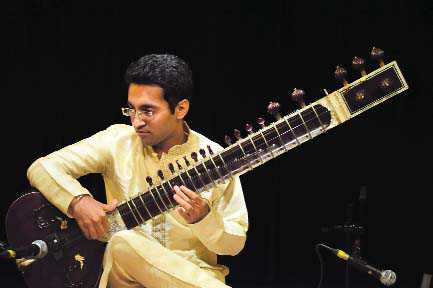
Sitarist Dhruv Bedi. Photo: Bharat Tiwari
By Shaili Khanna
Music, and classical music in particular, has been a part of the Punjab psyche. The oldest classical music festival in North India, Harivallabh, takes place in Jalandhar; there were gharanas specific to Punjab (Patiala, Kapurthala, Sham Chaurasia, Talwandi); Punjab has also produced several musicians through the ages (in more recent times Ustad Allah Rakha Khan, Ustad Bade Ghulam Ali Khan, Pt Dilip Chandra Bedi to name a few), and the music tradition at Satguru’s Bhaini Sahib is truly astounding.
The extent of the musical knowledge contained in the Guru Granth Sahib is stupendous: of the nearly 1,500 verses, it is mentioned before each verse which raga it is to be recited in. The first Sikh sitariya to be publicly honoured was late Raja Mrigendra Singh of Patiala (William, to his intimates) who received the Sangeet Natak Akademi Tagore Puraskar in 2011; but he did not play in public as such. He had trained under Ustad Mehboob Ali Khan, a disciple of the Kapurthala Senia gharana.
Dhruv Bedi is an unusual 26-year-old: he is widely seen among the leading sitariyas. He plays in the tradition of the premier sitar gharana of India, the Imdadkhani Gharana of Etawah. He is articulate and multi-dimensional. “I am a third-generation musician, as my great grandfather, who was from Dera Baba Nanak Sahib, sent both my grandfather and granduncle to Gwalior to learn music from Pt Krishnarao Shankar Pandit. I started learning the sitar from the age of 4,” says Dhruv.
He also played the surbahar, (the bigger bass sitar) as it makes the sitar playing much more fluid. “From 2009, I have been fortunate to learn from maestro Pt Budhaditya Mukherjee.”
Mukherjee is a highly respected figure in North Indian classical music. “He is indeed a rare teacher. I first heard him live in 2002, and was totally riveted. He is so particular about technical things that he makes his own mizrab (the metal wire plectrum with which one plucks the sitar wire) of a particular gauge wire for better sound effects,” says Dhruv.
Whenever Dhruv goes to Kolkata to learn from Pt Mukherjee he stays in his house like a family member. “He helps me to focus in the old guru-shishya tradition. He is a hard taskmaster. He makes the most difficult things look simple,” says Dhruv.
About how he feels like performing in front of heads of state, Dhruv says he focuses only on performance. “In school I performed in front of President Dr APJ Kalam; in 2002 I played in Davos where PM Manmohan Singh was in the audience and at the BRICS Summit where so many heads of state were present. Recently I also performed for Bangladesh PM Sheikh Hasina and our PM Narendra Modi. It does feel good.”
His day is divided into sitar practice and hearing vocal music. “I love Carnatic music too. I also love the tabla, and have learnt how to play it. In fact, my days are only about music.”



























